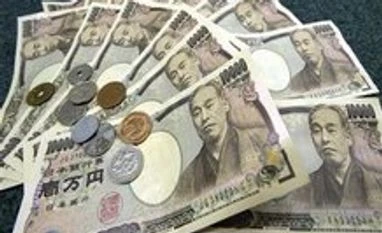The euro climbed to a three-year peak of 128.44 yen, while the dollar gained 1.5 % to sweep past 99 yen after the BoJ conducted its first bond purchases since announcing the new monetary easing steps last week.
"The speed with which we've come through from 95 to 99 (yen) is absolutely astonishing. How much further we go beyond that, who knows?" said Simon Derrick, chief currency strategist at BNY Mellon Corp.
Since new BoJ Governor Haruhiko Kuroda promised on Thursday to inject about $1.4 trillion into the economy in less than two years, the yen has fallen more than 6 % against both the dollar and the euro, while Japanese stocks have soared.
Japan's Nikkei stock average jumped as much as 3.1 % on Monday to its highest level since August 2008.
"The BoJ's bazooka has sparked the buying of Japanese stocks, especially domestic sectors like real estate," said Yasuo Sakuma, a portfolio manager at Bayview Asset Management.
The prospect that Japanese investors will move out of their domestic debt market due to the heavy central bank buying has boosted the attractiveness other higher-yielding debt, giving Spanish and Italian government bonds a boost.
But Portuguese bonds bucked the trend after a constitutional court on Friday rejected four out of nine austerity measures in the government's latest budget, undermining its efforts to meet the terms of a bailout deal.
Spanish 10-year bond yields dropped 6 basis points to 4.72 %. Equivalent Italian bonds fell 10 basis points to 4.31 %. The Portuguese 10-year bond yield rose 8 basis points to 6.5 %.
SHARE RECOVERY
Meanwhile European share markets staged a recovery from the one-month lows hit on Friday when disappointing U.S. jobs data sparked fears that the recovery in the world's biggest economy was losing momentum.
The stock market's robust rally was slowing even before Friday's jobs report, but the red flag sent up by the weak employment data makes the path to further gains less secure.
In early trading the FTSEurofirst 300 index of top European shares was up 0.5 % in morning trade, with London's FTSE 100 , Paris's CAC-40 and Frankfurt's DAX all up 0.3 to 0.6 %.
U.S. stocks were also expected to post a slight recovery when Wall Street opens after they posted their worst day of the year on Friday on the weak jobs report, which also undermined confidence in the first-quarter corporate earnings outlook.
Earnings season starts on Monday with aluminium producer Alcoa , while major bank JPMorgan Chase & Co and Wells Fargo & Co are due to report on Friday.
Overall, S&P 500 earnings are expected to have risen 1.5 % in the last quarter, down from a 4.3 % gain forecast at the start of the year, according to Thomson Reuters data.
CHINA DATA EYED
Oil prices staged a similar recovery to equities, rebounding more than $1 per barrel, having hit eight-month lows at the end of last week.
However, oil is expected to trade in a tight range this week ahead of a spate of economic data from China that will throw light on the pace of recovery in the world's second-biggest oil consumer and ON its monetary policy.
"The oil markets are currently enjoying the support of upcoming liquidity after the BoJ announcement last week, but they are still digesting the disappointing jobs data from the U.S.," said Ker Chung Yang, senior investment analyst at Phillip Futures in Singapore.
Brent crude rose $1.05 per barrel to a high of $105.17 before settling around $105. U.S. crude rose 66 cents to $93.36 per barrel after logging its biggest weekly loss in more than six months last week.
A rise in Chinese steel futures to their highest in more than a week in anticipation of improving demand in the world's second biggest economy during the second quarter supported other industrial commodities like copper and iron ore.
Three-month copper on the London Metal Exchange climbed 1.13 % to $7,490 a tonne, up from an eight-month low of $7,331.25 hit last week. The metal is still down more than 3 % over the past three weeks.
Benchmark iron ore with 62 % iron content for immediate delivery to China was steady at $135.90 a tonne.
You’ve hit your limit of {{free_limit}} free articles this month.
Subscribe now for unlimited access.
Already subscribed? Log in
Subscribe to read the full story →

Smart Quarterly
₹900
3 Months
₹300/Month
Smart Essential
₹2,700
1 Year
₹225/Month
Super Saver
₹3,900
2 Years
₹162/Month
Renews automatically, cancel anytime
Here’s what’s included in our digital subscription plans
Access to Exclusive Premium Stories Online
Over 30 behind the paywall stories daily, handpicked by our editors for subscribers


Complimentary Access to The New York Times
News, Games, Cooking, Audio, Wirecutter & The Athletic
Business Standard Epaper
Digital replica of our daily newspaper — with options to read, save, and share


Curated Newsletters
Insights on markets, finance, politics, tech, and more delivered to your inbox
Market Analysis & Investment Insights
In-depth market analysis & insights with access to The Smart Investor


Archives
Repository of articles and publications dating back to 1997
Ad-free Reading
Uninterrupted reading experience with no advertisements


Seamless Access Across All Devices
Access Business Standard across devices — mobile, tablet, or PC, via web or app



)
